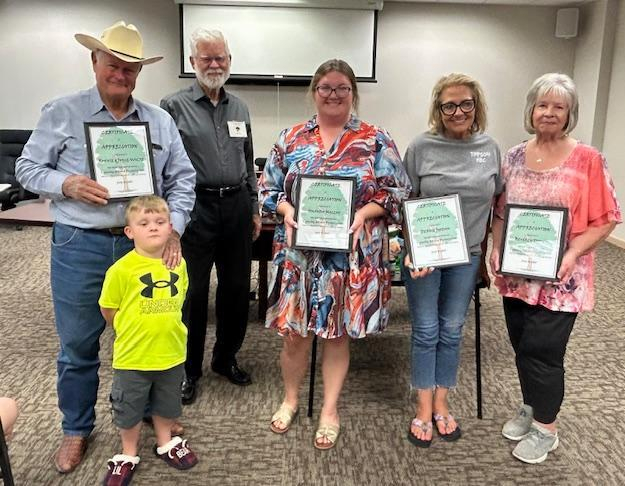
June 20, 2025 - “Since the pandemic, I think most of us have come to realize how important it is to know how to preserve food,” began Ronnie Wolfe at the June meeting of the Timpson Area Genealogical and Heritage Society last Wednesday. “I think it may become even more important before even I pass on,” he continued. “I'm sponsoring a school garden at TISD this year and want to see it develop into a farm-to-table program. I contacted TAGHS and said I'd really like to do a canning seminar here. However, 'canning' is really a misnomer now. When I was growing up it was canning but now it's 'jarring' since nobody uses metal cans much anymore. Whatever we call it, we're talking about preserving food and I have invited three ladies who are avid canners here to help with this presentation: Debbie Jordan, Beverly Tippett, Amanda Malloy, as well as my wife, Joyce.”
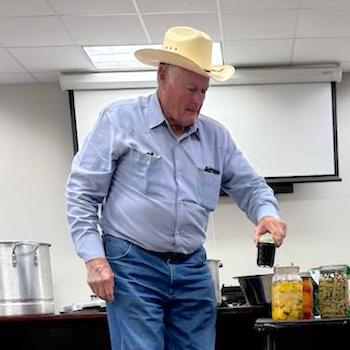
“When I was growing up we bought cans from Continental Can Company out of Houston, 100 cans to a box, and put up about 150 cans of peas, 50 cans of corn, vegetable soup, pinto beans, green beans, and survived all winter on that. The next year, we started over,” continued Wolfe. “If you want to tenderize the food you're preserving, use a pressure cooker. You wouldn't want to use a pressure cooker for peaches, for example, because they would just cook to mush, but they're great for other things. If you look around at garage and estate sales you can find used pressure cookers in good condition. Don't buy a fourteen quart pressure cooker though, because when they are full they are very heavy and hard to lift off the stovetop. They come with a booklet that tells you how to use the cooker and how long and at what pressure to cook various foods, but if that's missing it's no problem. You can find and download the booklets online. You can find the other supplies you need at Walmart. Used according to the instruction, pressure cookers are safe, but if you try to open one while it is still pressurized you're going to have a bad experience!”
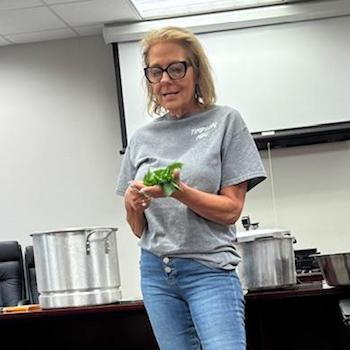
Second on the program was Debbie Jordan, who began by saying “I know it's blasphemy in East Texas, but I don't like fresh tomatoes. However, my uncle, Ronnie Wolfe, kept giving them to me and I had to figure out what to do with them. My family and I love spaghetti sauce so I decided I would try making some from the tomatoes. The spaghetti sauce turned out fine but I had so much of it I needed to preserve some so I began putting it up in quart jars.” Displaying a jar of 'store-bought' spaghetti sauce, Mrs. Jordan noted that it contained fourteen ingredients. “The sauce I make has about six. It's redder, it tastes better, has no preservatives, and it's better for you. I think it's important to use fresh herbs in the sauce and I get them from my garden. I also make a smaller amount of tomato jam, which contains nothing but tomatoes and sugar. I use super-clean hot jars to preserve my sauce and jam. I take my jars out of the dishwasher while they're still hot and boil my lids just before I use them. I turn my sealed jars over because I want the lids to stay hot and I think it ensures a better seal.”
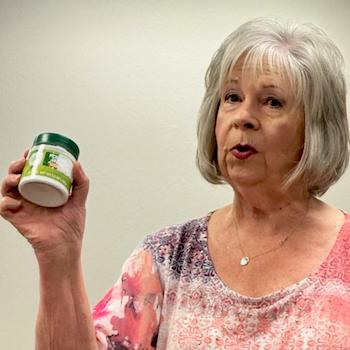
“I brought copies of recipes for the pickles and pickled okra I'm going to talk about today and they're on the table,” began the next presenter, Beverly Tippett. “Most of them came from the internet or Facebook. I also have some samples for you to try. I want to talk about pickled okra first. You'll see that the recipe doesn't specify an amount of okra so your guess is as good as mine, but the amount of the other ingredients is given. It calls for one quart of white vinegar, one quart of water, a half cup of pickling salt, dill seed, cayenne pepper if you want it, three garlic cloves, and one fourth teaspoon of Pickle Crisp granules per jar. Even though the samples I brought are cut up, I pickle my okra whole and leave the stem on. I suggest using smaller baby okra rather than the large pods because they are more tender. Those are done in a hot water bath, not a pressure cooker. The pickles I brought are made using Mrs. Wages Pickling Lime and the recipe is on the back of the package. It calls for seven pounds of medium sized pickling cucumbers. Again, don't use the big ones because they have large seeds. Also, one cup of pickling lime, two gallons of water, two quarts of Mrs. Wages Pickling and Canning Vinegar, eight cups of granulated sugar, one tablespoon of pickling and canning salt, and a tablespoon of Mixed Pickling and Canning Spices. You have to watch your timing on each step of the pickling process and it take about two or three days to do a batch. You preserve them using the hot-jar process that has already been described. I also brought some blueberry jam I made this week. Panola Orchards had over-ripe blueberries, which are perfect for preserving, for $1.50 a pound so I bought some. You mash six cups of blueberries in your pot with a potato masher or something similar. Add two tablespoons of freshly squeezed and strained lemon juice, four cups of sugar, and a package of Sure-Gel. This made four eight ounces jars and eight four ounce jars. You could probably use this recipe for blackberry jam too. You can strain the seeds out after you've cooked them a while if you want to.”
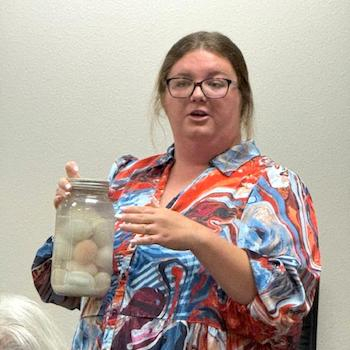
“I brought a pressure canner to show you today,” began Amanda Malloy. “I got mine at Walmart. It doesn't have a pressure gauge but yours may. You fill it with about three quarts of water so it doesn't go dry. I make blueberry jam and I brought some today. I don't boil my jars, I put them in the oven for twenty minutes at 250 degrees to sterilize them. I have started pressure canning dried potatoes. It's super easy and their already cooked right out of the jar. I cube mine but you can slice them. You soak them in cold water for twenty minutes, rinse them and soak them in fresh water for another twenty minutes. Pack your jars all the way to the top because when you can them they shrink down. Put a teaspoon of canning salt in them and then put them in your pressure canner for forty minutes. My next thing is water-glassed eggs,” continued Mrs. Malloy. “If you haven't tried doing them, don't be hesitant. You put an ounce of pickling lime in a quart of water. Fill your jar with as many eggs as will fit. They need to be fresh and clean. Do not wash them. That destroys the bloom. They will stay preserved for a number of years this way, but if an egg breaks in the jar, you should throw the whole jar away. Water-glassed eggs are runnier than fresh eggs, so you can't fry them, but they are fine for scrambling and baking.” At the conclusion of the program, members and guests sampled the various preserved foods that had been brought by the speakers.
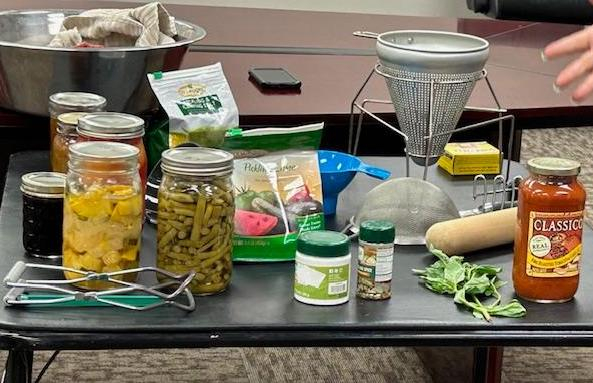
TAGHS meets at 2PM on the third Wednesday of each month in the meeting room of the Timpson Public Library, located on the corner of Austin and Bremond Streets. The public is always welcome.









